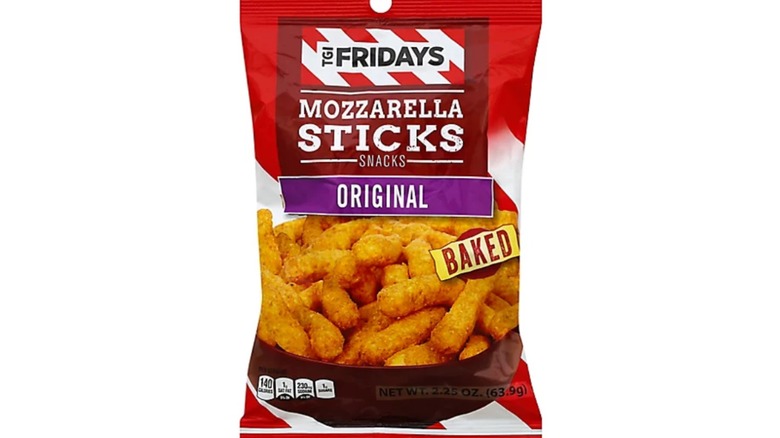Manufacturer Behind TGI Fridays 'Mozzarella Sticks' Snack Is Being Sued For Using Cheddar
Food lawsuits are a dime a dozen these days. Just last week, a woman in Florida sued Kraft for $5 million claiming that its Velveeta brand microwave mac and cheese takes more than the 3½ minutes to make that the package states. The plaintiff claimed she "would not have purchased it or paid less had she known the truth." (via CNN Business). Then there was a New York man who filed suit against Kellogg's in March, claiming that the packaging of Frosted Strawberry Pop-Tarts is "misleading because the label gives the consumers the impression the fruit filling only contains strawberries as its fruit ingredient."
The Pop-Tarts case was dismissed by a federal judge who ruled that "no reasonable person would" think the only ingredient is "fresh strawberries" based on the box (via NPR). But would a reasonable person expect a product that has the words "mozzarella stick" in its name to contain a different kind of cheese instead? A new lawsuit has just hit the books, this one dealing with ingredients in TGI Fridays Mozzarella Stick Snacks.
Inventure Foods finds itself in a cheesy mess
Illinois resident and plaintiff Amy Joseph is part of a class-action lawsuit that was filed against TGI Fridays and the makers of its Mozzarella Stick Snacks (not to be confused with the restaurant's mozzarella sticks), Inventure Foods, last year. Allegedly, the companies misled reasonable consumers into believing the Mozzarella Snack Sticks are made with mozzarella cheese when, in reality, they contain cheddar cheese (via USA Today).
A Chicago judge dismissed the case against TGI Fridays, stating that it was only the logo on the packaging that associates the restaurant chain with the product, but is allowing the case against the manufacturer of the mozzarella sticks, Inventure Foods, to proceed. Inventure Foods contested the claims, with Reuters writing, "no reasonable consumer would believe a 'shelf-stable, crunchy snack product' contained actual mozzarella."
When the news broke, some consumers flocked to Twitter to share their two cents. "Well they [the plaintiff] do sort of have a point," wrote one user, while another chimed in, "Honestly in America they should think themselves lucky that they have any real cheese in it at all."

